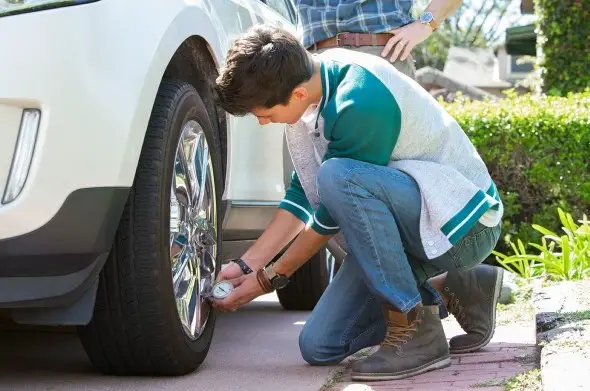Tires need air because tires are made of rubber which can be elastic, meaning they can stretch or contract.
The air in the tire not only helps make things easier for your car to move but also makes sure that you have a great grip when you’re on the road!
If there were no pressure inside a tire, it would just go flat right away, much like what happens with over-inflated balloons.

Why Do Tires Need Air
There’s always some degree of pressure in any inflated object – even an elastically flexible balloon will experience greater “resistance” towards bending as more and more air is pumped into it. Course, this is all well and good when dealing with inflatable vessels like watermelons..
The History of Tires
They’ve been around since the invention of automobiles. Initially, they were just wrapped in canvas,
but it wasn’t long before rubber was discovered and applied for tread protection. Charles Goodyear spearheaded that discovery, which is why tires often carry his name on them today.
He called his new material “vulcanized rubber.” Cars could now be built lighter because much heavier metal components like springs, fittings, and rims were no longer necessary to support weight loads without deforming the tire’s shape over time.
Higher speeds became possible with these early cars since their wheels no longer needed to accommodate mechanical brakes,
air brakes could do what previously required heavy-duty brake cables instead during emergency stops. And cars themselves no longer need f
What are the benefits of keeping your tires inflated properly?
Proper tire inflation can help reduce the risk of air leaks, improve fuel efficiency and improve the appearance of your tires.
The benefits of optimal tire pressure are not limited to those just mentioned. By obtaining correct inflation pressure, you will see:
safer driving conditions and a longer life for your spare; more stability and control during emergency maneuvers and zigzag scenarios;
reduced rolling resistance that equates to improved gas mileage; more even wear on all four tires due to an increase in tread depth on front tires (occurs as part-time spent off-center is shortened);
less heat generated inside the tire (less heat – less cracking). Widely recommended by experts as one of the best ways to protect yourself from getting fined or having expensive accidents.
How often should you check your tire pressure?
Check your tire pressure monthly at the bare minimum, but the more you drive your car, the more frequently it can be checked.
If you drive 10,000 miles a year (just commuting to work and doing an occasional errand), check your air pressure about once every two months.
If you drive 15,000 miles yearly on highways, checking your tire pressure becomes even more important because it should be done about once every month on that kind of mileage.
Finally- if you’re on the road every day with heavy loads or live in an area with extreme climate changes, then likely checking your tire pressure weekly is called for.
Can tires be made without air?
Yes. Between 1875 and 1920, a series of vehicles from Michelin Company from France emerged as the first viable rubber tires mass-produced. This French company experimented with ways to manufacture something literally without air, making it one of the only patents ever filed for ideal tire design today.
In this sense, tires can be manufactured without air because there is no need for gas pressure to inflate these kinds of wheels. They are designed to carry different types of loads by distributing weight uniformly across its periphery rather than just on the surface like an ordinary solid wheel would do. Until then, there was also no adequate material that would be strong enough to support large truckloads, which eventually drove them.
How much air should I put in my tires?
Depends on your car, but usually, it’s recommended to keep about 30 psi in winter.
Every car has a different tire pressure setting, so check the manual or ask someone who works at an auto shop. But if you’re driving around in the winter, it’s important to know that tire pressure needs to change with temperature because cold temperatures affect gas pressure inside rubber tubes. As the weather is cooling off and roads are getting slick, most experts recommend keeping 25 psi of air in each tire for added traction.
Why do tires lose air?
Several things can cause a tire to lose air. One cause of slow leaks sometimes stems from your tire’s valve – for this; it is necessary to go and change the valve core with a durable one.
Slow leaks may be caused by cracks in the sidewalls or tread, or both. If you detect such, there is also the option of adding special sealant which will plug up those tiny holes and leak no more!
A common reason people experience little or no pressure loss (flat tires) may be due to underinflation: any few pounds per square inch (PSI) below recommended PSII can serve as an invitation for issues like sidewall bulges, slow leaks, and blowouts.
Conclusion
Why do tires need air? Tires are made up of two parts, the rubber and the steel. The steel provides support to hold your car in place while it is driving. When you drive with a flat tire, the weight on that side can cause uneven wear on your other three tires, which could lead to premature failure.
A properly inflated tire also helps reduce noise from bumps in the road or potholes by providing more cushioning for these changes in terrain. So make sure you keep an eye out for any leaks when checking your monthly gas mileage logs, so you’ll know if there’s anything wrong before it gets worse!

AR Jeet has been a tire mechanic for over 2years. He has worked on all types of vehicles, from cars and trucks to RVs and ATVs and motorcycles. He has seen it all when it comes to tires, and he knows how to fix them.
AR Jeet is a tire expert, and he is passionate about his work. He loves to help people keep their vehicles running smoothly, and he is always happy to answer any questions that people have about their tires.
If you need help with your tires, or if you just want to learn more about them, then AR Jeet is the man to talk to. He will be happy to help you out, and he will make sure that you get the best possible solution.
He has a blog [Tirespick.com] where he writes about all things tire-related, and he is always happy to help people with their tire needs. Know more about AR Jeet.

